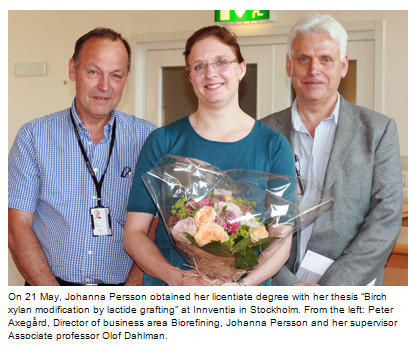Green modification of the natural polymer xylan improves a number of material properties according to new licentiate thesis by Johanna Persson.
One of the biggest driving forces behind biorefining is replacing today’s fossil-based products with alternatives made from renewable resources. Wood raw materials are both renewable and plentiful, but the biggest gains are made if the residual products from the kraft pulp mill that leach out during cooking can be used. These residual products include lignin and hemicellulose. Innventia has carried out successful research and development into processes within the field of lignin with many potential products such as carbon fibre, activated carbon and dispersants. Now, hemicellulose is also being introduced.
A significant proportion of hardwood – up to 30 percent – consists of the hemicellulose xylan. Xylan is a natural polymer that is leached out from the fibres but not destroyed during kraft cooking. Xylan could therefore be used as a raw material for manufacturing barrier films for food packaging or other polymer materials. However, there are a number of difficulties when using xylan: it is water soluble, it is not thermally formable, and it is not easy to make films from. Johanna Persson has taken on these challenges in her studies.

“I took the fact that we can already produce xylan from black liquor as my starting point,” she explains. “Using chemical modification – an organic synthesis – I then tried to influence the hydrophilic, thermal and film-forming properties.”
The modification involves grafting lactide, which is produced in plants, onto xylan, thereby creating branches – or side chains – of polylactide. The length of these chains determines the properties of the material.
“The difficulty comes in controlling the length of these chains,” continues Johanna. “An article I read led me to discover a catalyst (triazabicyclodecene) that has proven to be highly effective. We can now produce lactide-grafted xylan with a specific branch length, giving us a broad spectrum of different materials that can be processed thermally and are not soluble in water. We can also produce strong self-supporting films with a tensile strength of up to 48 MPa.”
“Our use of ‘green modification’ may result in many new applications from renewable resources such as xylan,” adds Olof Dahlman, who was Johanna’s supervisor at Innventia.
